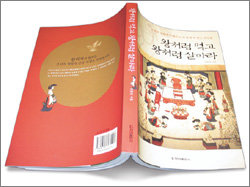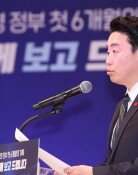Sparrow Porridge was Viagra for a King
Sparrow Porridge was Viagra for a King
Posted November. 05, 2004 23:08,

A Kings Life during the Joseon Dynasty was Similar to that of a Modern Man.--
Its Delicious. It tastes different, although I eat this all the time. Many male viewers, who were watching the costume drama on TV where a maid working in a kings kitchen was a heroine, probably licked their lips many times thinking, What a great life the king has! After all, one of the kings daily rituals seems to be making a remark on each delicacy the best chefs in the country have painstakingly created for him. At least, it looks like that on the TV show.
But, you dont have to be envious anymore.
The author, who is an Oriental medicine doctor, gives the verdict, If we were to find a person who lived in a similar environment as the modern man, it would be a king [from the Joseon Dynasty].
Hyper nutrition and little physical movement, long working hours and continuous stress, these are reasons why many kings in the Joseon dynasty suffered from geriatric diseases such as obesity, diabetes, and hypertension. Due to poor blood circulation, they almost always had eye diseases as well as boils on the skin.
However, a king still had a kings life. As seen on this costume drama, a king usually had a troop of the best doctors in the country serving him as well as having the best chefs feeding him. Maybe we, living like an old days king, can learn how to lead a healthy life from the secret methods shared by the kings doctors.
Eat Small Meals Five Times a Day Drinking Was Recommended for Your Health--
First of all, the Joseon dynastys kings ate small meals often and regularly. Preparing five meals a day for a king wasnt probably an easy task, however. A seasonal dish was always served; in the spring, Oh Shin Ban, an assorted spring vegetable plate, in the summer, especially on Dan O day, Jehotang, cooling, natural refreshment was served. Kings ate crops and fruits freshly harvested in the autumn and Jun Yak, gelatinized beef broth in the winter.
Alcohol was an integral part of the well-being living method. Whenever King Se Jong was too worried about the drought of the country to drink any alcoholic beverage, all the ministers and the court doctors urged him to drink. Some of the courts brewing methods were handed down to private houses and recreated as superior liquors like Gyeongjus Gyodong Bupju.
Physical activities were encouraged, although most of the kings didnt follow the recommendation. It may sound strange, but kings played golf. Gyukgu, known to us as a similar game to polo. One type of it was a version without a horse. During the non-horse game of Gyukgu, one has to put a ball in a hole. An egg-sized ball was carved out of agate, and the clubs were made with thick bamboo and buffalo leather. Just like golf, multiple clubs were used for the game. For a fast shot, for example, a club with a thin leather lining was used.
Other sports enjoyed by kings were hawk hunting and archery. Archery was a sport truly fit for a head of the state; it helps to improve concentration and temperance. It is also a good abdomen breathing exercise.
The Average Life Expectancy of Joseon Kings was Forty-Six Usually Long-Lived--
Night Life was rightfully an important factor for a healthy living. Eunuchs in the court memorized the bedroom secret, limiting the frequency of sex to twice a day in the twenties, once a day in the thirties, and once every three days in the forties. To boost a kings stamina, sticky rice porridge with sparrow meat was served. There was a saying that court ladies became very exhausted after serving a king on the day when he had this porridge.
All efforts were made for a kings longevity, but the average life expectancy of the twenty-five kings of Joseon, excluding Yeonsangun and Gwanghaegun from all twenty-seven heads of the state, was about forty-six years.
You might think, (that is) not that long for a king . but it wasnt that bad considering the hyper nutrition and high stress levels from work. Also, the kings with untimely deaths were usually the ones who ignored the doctors recommendations or relied on unqualified medical men. Even a king with the power to rule a whole country was harmed when he disobeyed the laws of nature.
Yoon-Jong Yoo gustav@donga.com






![전셋집 보일러 고장 났다면 수리비는 집주인 몫[부동산 빨간펜]](https://dimg.donga.com/c/138/175/90/1/wps/NEWS/IMAGE/2025/12/04/132901947.1.jpg)
